2023 marked a year of transition for the PHP ecosystem, with upward of 72% of companies performing at least one PHP migration within the last year — and many of those moving off PHP 7.4 and on to PHP 8.x versions. Despite emerging challenges and competing priorities, companies are clearly prioritizing the security of their applications.
However, the state of PHP in 2024 isn’t so straightforward. Nearly 55% of teams are still running end-of-life (and consequently, unsupported) PHP versions in their production applications, with smaller companies struggling to keep pace with the rapid pace of PHP release and support lifecycles. Our survey also noted a significant disconnect – teams deploying end of life PHP still felt confident in the security of their PHP applications, with C-Suite respondents even more confident than their development teams.
That dissonance aside, our survey data is clear: the future for PHP is bright. PHP remains a much-loved language for developing innovative and highly-scalable web-facing applications and APIs.
Editor's Note: The 2025 PHP Landscape Report is now available. Get the latest on the state of PHP by downloading the 2025 edition of the report.
About the Presentation
Join Zend Senior Product Manager Matthew Weier O’Phinney in this on-demand webinar as he discusses key findings from the Zend 2024 PHP Landscape Report, including:
- PHP version adoption trends and how adoption varies by firmographic profile
- PHP migration trends, including top pain points by migration path
- The perceived (and actual) state of security and compliance within PHP applications
- Key shifts in PHP application deployment strategies and why it matters
- The top technologies used in developing and deploying PHP applications today
- Emerging trends teams need to account for in 2024
- And more!
Read the Full 2024 PHP Landscape Report
Presenters

Matthew Weier O’Phinney
Matthew Weier O’Phinney is the Principal Product Manager at Perforce Zend and OpenLogic, where he focuses on creating the tools developers need to build and deploy their applications. He is a founding member of the PHP Framework Interop Group (PHP-FIG), which creates and promotes standards for the PHP ecosystem, where he has served two elected terms on the PHP-FIG Core Committee and collaborated on many specifications.
Matthew began developing on Zend Framework (ZF) before its public release, and he led the project for Zend from 2009 through 2019. He acts as the Project Lead for the Laminas Project, which includes the subprojects Laminas API Tools (formerly Apigility) and Mezzio (formerly Expressive). He has contributed to many open source projects and communities, many of which can be found on github and his personal website.
